Add this eBook to your basket to receive access to all 258 records. Our indexes include entries for the spelling beaver. In the period you have requested, we have the following 258 records (displaying 1 to 10): These sample scans are from the original record. You will get scans of the full pages or articles where the surname you searched for has been found. Your web browser may prevent the sample windows from opening; in this case please change your browser settings to allow pop-up windows from this site. Patent Rolls: entries for Yorkshire
(1275-1276)
Calendars of the patent rolls of the reign of king Edward I are printed in the Calendars of State Papers: but these cover only a fraction of the material on the rolls. From 1881 to 1889 the reports of the Deputy Keeper of the Public Record Office also include calendars of other material from the rolls - about five times as many entries as in the State Papers - predominantly mandates to the royal justices to hold sessions of oyer and terminer to resolve cases arising locally; but also other general business. The calendar for the 4th year of king Edward I [20 November 1275 to 19 November 1276], hitherto unindexed, is covered here. | Sample scan, click to enlarge
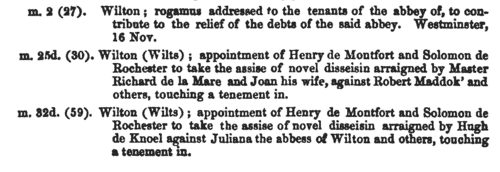
| Retired monks, nuns and chantry priests in the east Midlands
(1547-1551)
Lists of pensions being paid to monks, nuns and chantry priests in the diocese of Lincoln after the dissolution of the monasteries and chantries. The diocese covered Bedfordshire, Buckinghamshire, part of Hertfordshire, Huntingdonshire, Leicestershire and Lincolnshire. Oxfordshire, Northamptonshire and Rutland, which had been shorn from the diocese, are not covered by these returns.
| Sample scan, click to enlarge

| Cecil Manuscripts
(1572-1582)
Letters and papers of William Cecil lord Burghley, Lord Treasurer. Includes some other material as early as 1553. | Sample scan, click to enlarge
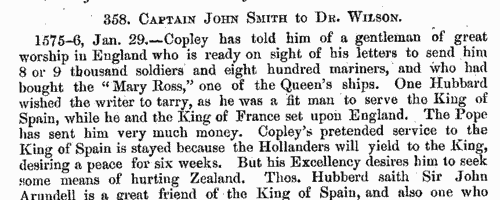
| Middlesex Sessions
(1603-1625)
Incidents from the Middlesex Sessions Books. These are abstracts of sessional orders, minutes of criminal cases, memoranda and other entries of record taken from the three volumes of Gaol Delivery Register, four volumes of Sessions of Peace Register and two volumes of Process Books of Indictments for the county of Middlesex from the reign of king James I. The references at the end of each item indicate the volume in question, the abbreviations being G. D. for Gaol Delivery, S. P. for Sessions of Peace, and S. O. T. for Session of Oyer and Terminer; occasionally preceded by S. for Special or G. for general, or followed by R. for Roll or Reg. for Register. It should be noted that, in the case of 'true bills' or indictments, the abstract starts with the date on which the offence took place, the date of the conviction &c. being at the end of the entry. | Sample scan, click to enlarge
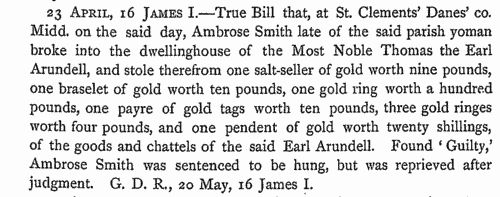
| Yorkshire Marriage Licences
(1630)
William Paver, a 19th-century Yorkshire genealogist, made brief abstracts of early marriage licences (now lost) in York Registry | Sample scan, click to enlarge

| British in the East
(1630-1634)
The East India State Papers centre on the records of the East India Company, trading to India, the East Indies, Persia and China. They include the Court Minutes of the East India Company. | Sample scan, click to enlarge

| Prerogative Court of Canterbury Wills: Rutland: Strays
(1658)
William Brigg compiled abstracts of all the wills in Register "Wootton" of the Prerogative Court of Canterbury. The abstracts of those proved in 1658 were published by him in 1894. The court's main jurisdiction was central and southern England and Wales, as well as over sailors &c dying abroad. We have re-indexed the whole volume, county by county, for both testators and strays (legatees, witnesses and other persons mentioned in the abstracts). | Sample scan, click to enlarge
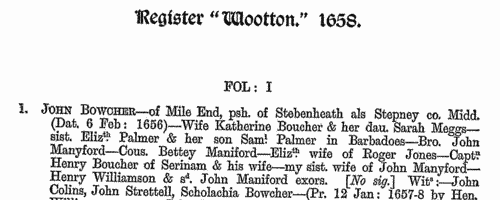
| Surrey Sessions
(1661-1663)
Surrey Sessions Rolls and Order Books. These are abstracts of sessional orders, minutes of criminal cases, memoranda and other entries of record taken from the Order Books from October 1661 to January 1663, inclusive, and the Sessions Rolls for October 1661, January 1662, April 1662, July 1662, October 1662 and January 1663. | Sample scan, click to enlarge

| Middlesex Sessions
(1625-1666)
Incidents from the Middlesex Sessions Books. These are abstracts of sessional orders, minutes of criminal cases, memoranda and other entries of record taken from the volumes of Gaol Delivery Register, Books and Rolls, Sessions of Peace Register, and Process Books of Indictments for the county of Middlesex from the death of king James I to the Great Fire of London. The references at the end of each item indicate the volume in question, the abbreviations being G. D. for Gaol Delivery, S. P. for Sessions of Peace, and S. O. T. for Session of Oyer and Terminer; occasionally preceded by S. for Special or G. for general, or followed by R. for Roll or Reg. for Register. It should be noted that, in the case of 'true bills' or indictments, the abstract starts with the date on which the offence took place, the date of the conviction &c. being at the end of the entry. These abstracts, prepared by John Cordy Jeaffreson for the Middlesex County Record Society, are far from being a complete calendar of these extensive records; his purpose was, in part, to notice 'every parchment that should exhibit a famous person's name or any other feature of personal interest'. | Sample scan, click to enlarge
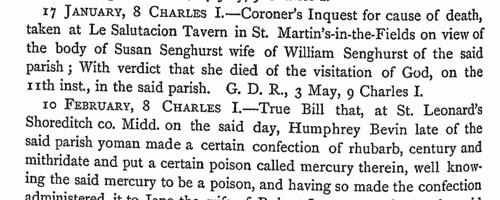
| Allegations for marriages in southern England
(1660-1679)
The province or archbishopric of Canterbury covered all England and Wales except for the northern counties in the four dioceses of the archbishopric of York (York, Durham, Chester and Carlisle). Marriage licences were generally issued by the local dioceses, but above them was the jurisdiction of the archbishop, exercised through his vicar-general. Where the prospective bride and groom were from different dioceses it would be expected that they obtain a licence from the archbishop; in practice, the archbishop residing at Lambeth, and the actual offices of the province being in London, which was itself split into myriad ecclesiastical jurisdictions, and spilled into adjoining dioceses, this facility was particularly resorted to by couples from London and the home counties, although there are quite a few entries referring to parties from further afield. The abstracts of the allegations given here usually state name, address (street in London, or parish), age, and condition of bride and groom; and sometimes the name, address and occupation of the friend or relative filing the allegation. Where parental consent was necessary, a mother's or father's name may be given. The ages shown should be treated with caution; ages above 21 tended to be reduced, doubtless for cosmetic reasons; ages under 21 tended to be increased, particularly to avoid requiring parental consent; a simple statement 'aged 21' may merely mean 'of full age' and indicate any age from 21 upwards. These are merely allegations to obtain licences; although nearly all will have resulted in the issuing of the licence, many licences did not then result in marriage. This index also includes marriage licence allegations for the jurisdiction of the Dean and Chapter of Westminster, 1558 to 1699. | Sample scan, click to enlarge

|
Research your ancestry, family history, genealogy and one-name study by direct access to original records and archives indexed by surname.
|











